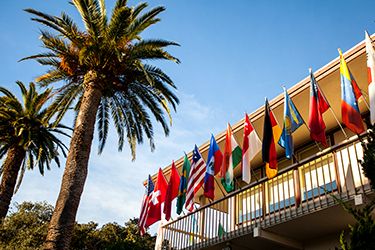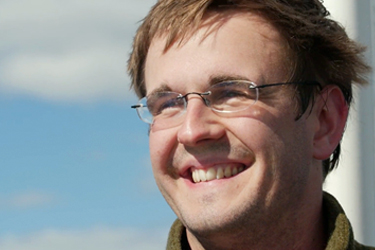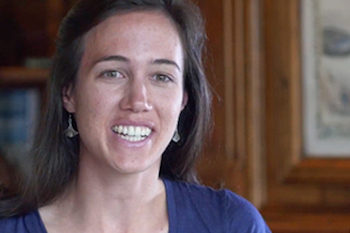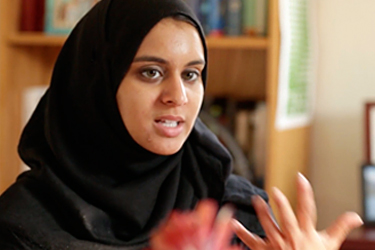|
The Digital Liberal Arts Initiative is a campus-wide opportunity for faculty to explore the digital methods that are changing scholarship in the humanities and arts—to discover new modes of collaboration, to learn new skills for research and pedagogy, and to discuss and debate what digital technologies mean for our teaching and scholarship. |
The Middlebury School of the Environment, now in its second year, is a six-week intensive summer program, taught by some of the finest faculty and mentors in the field, providing practical experience and leadership training for undergraduates. |
|
The Programs on Creativity and Innovation in the Liberal Arts (PCI), established in 2007, help make intellectual risk taking and creative problem solving second nature to Middlebury students. With financial support through grants and competitions, and designated workspaces around campus for individual and group projects, PCI provides opportunities for students to explore ideas in a nonacademic setting. |
The Center for Social Entrepreneurship (CSE) builds on Middlebury’s commitment to educating students in the tradition of the liberal arts. Our students learn to be effective agents of social change by reflecting on who they are, connecting with others, analyzing systemic challenges, and engaging the world around them. The center is Middlebury’s hub for a growing global network of schools, NGOs, government agencies, businesses, and foundations that share our commitment to social change. |
|
The Center for Careers and Internships has significantly increased its internship opportunities, creating more ways than ever for students to gain hands-on and real-world experience before graduating. |
Author Archives: Rebecca Walters
Our Global Footprint

Sustainability at Middlebury is integrated daily into all facets of its academics, operations, and planning. From its leadership in establishing the oldest undergraduate environmental studies program in the country to the state-of-the-art biomass plant, which the initiative helped to fund, sustainability is an integral part of how we teach, work, and play. |

The Middlebury Language Schools, is celebrating its 100th anniversary and now includes the School of Hebrew and School of Korean. |

The Middlebury C.V. Starr Schools Abroad added 26 new sites throughout Asia, Africa, and South America. |

The Middlebury Institute of International Studies at Monterey has significantly broadened the boundaries of a Middlebury education. The integrated degree program provides rich and rewarding opportunities. A student can attend a graduate program on an accelerated path and explore a more specified field to advance a potential career. |
Engaged Citizens
Meet four students who benefited from the many enhancements the initiative helped bring about.

Pier LaFarge ’10.5Co-founder and CEO of SparkFund “I think that one of the core values of a liberal arts education is fostering an academic environment that gives us the formal tools to look at these large important societal systems, like economics, while also having access to the artistic and emotional tools, like literature and poetry and art, to actually see and feel and experience the stories of those systems. Middlebury gives you an opportunity to really deeply explore subjects on an academic level and look at them from different angles. And I have translated a lot of the things that I learned into building a company and into building a team.” |

Andrew Locke ’11Research Manager, Harvard University “Behavioral economics is about doing a better job explaining why things are the way they are and how we can move them to the way we think they should be. I manage three offices that are running randomized control trials. So in the same way that you would test a new drug to determine effectiveness, using a treatment and control group, we do that with policy. My first exposure to behavioral economics was at Middlebury. What really turned me onto it was you could use math in a very, very concrete, explanatory way. And that was immediately exciting for me. So I think that was the real value of Middlebury in my life: it never closed any doors on what I wanted to do.” |
|

Marty Schnure ’10.5Cofounder, Maps for Good “Our mission with Maps for Good is to create one-of-a kind maps in digital media that promote conservation initiatives and connect people with places. Part of why I love the work I do now is that I’m right at the intersection of science, design, and social good, and that is really what I found in the geography department at Middlebury. My adviser completely changed the way I think about places, design, and how I can have an impact. I certainly wouldn’t be where I am now, if it weren’t for him.” |

Rana Abdelhamid ’15Founder, Woman’s Initiative for Self-Empowerment (WISE) “As a political science student, I’ve been able to see how individuals can have an impact on political systems and economic systems and also how to leverage those systems to empower disenfranchised communities. I wanted to use WISE as a space where these young Muslim women can gain the skills they need to access these different political institutions and economic institutions. So when the Center for Social Entrepreneurship first started on campus, I thought it was a great opportunity for me to be able to learn more about how I can make this initiative more sustainable. After graduation I plan on enrolling into a master’s degree program and to study public policy as a Thomas R. Pickering Fellow.” |
Priorities—and Results
Throughout the initiative, donors gave more than $530 million to Middlebury. This astounding generosity helped create a more diverse and accessible college, a larger and stronger faculty, and a more robust learning environment. Thanks to all of our donors, faculty, and staff.
ACCESS
|
EXPERIENTIAL
|
ACADEMICS
|
SUSTAINABILITY
|
ATHLETICS
|
Creating the Global Liberal Arts College
How do we build on the strength of the liberal arts to prepare our graduates to be effective in a changing world? That’s the question that drove our success in Middlebury’s largest fundraising effort ever.
